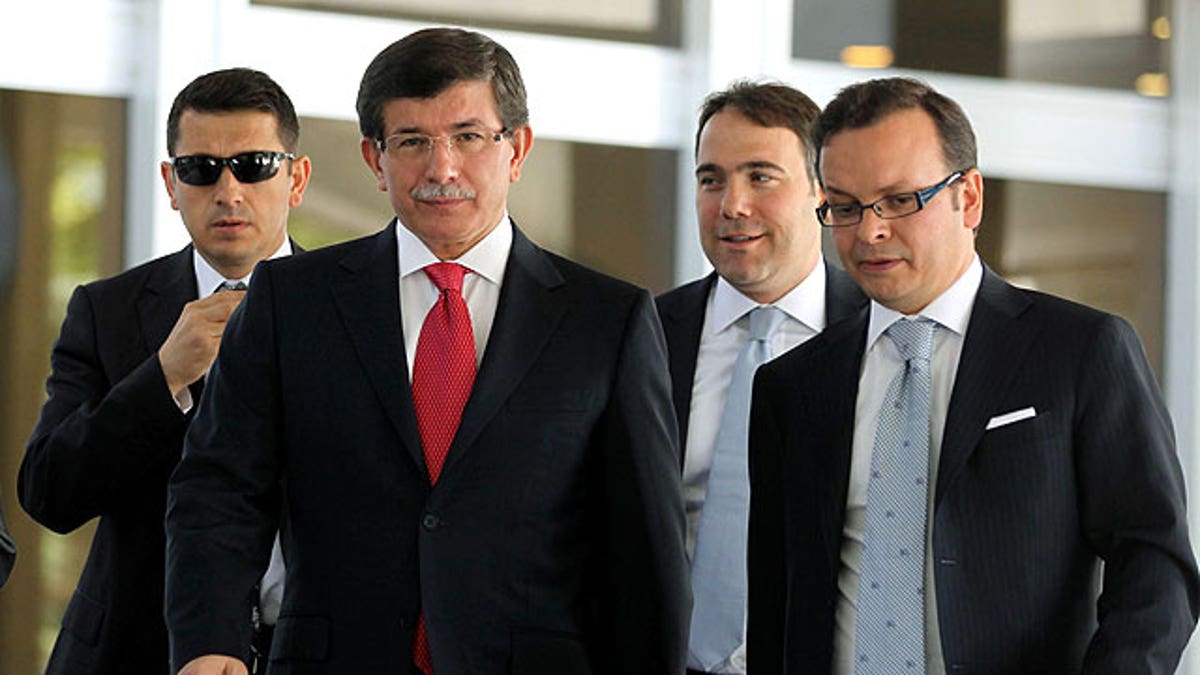
September 2: Turkish Foreign Minister Ahmet Davutoglu, centre left, leads advisors as he arrives to speak to the media in Ankara, Turkey. (AP)
UNITED NATIONS – Last year's Israeli raid on a Gaza-bound flotilla was "excessive and unreasonable" according to a U.N. panel that also blamed Turkey and flotilla organizers for contributing to the deaths of nine activists.
The panel's long-delayed report, released late Friday, was aimed at improving Israeli-Turkish relations, but has already led to a near rupture because of Israel's refusal to apologize for the deaths aboard the Mavi Marmara, the largest of the six vessels in the flotilla.
Earlier Friday, Turkey expelled the Israeli ambassador and suspended military cooperation.
The 105-page report said Israel's naval blockade of Gaza was legally imposed "as a legitimate security measure" to prevent weapons smuggling, but added that the killing of eight Turkish activists and a Turkish-American was "unacceptable."
"The events of May 31, 2010 should never have taken place as they did and strenuous efforts should be made to prevent the occurrence of such incidents in the future," the report said.
Israel insists its forces acted in self defense and says there will be no apology. Israeli officials pointed out the report does not demand an apology. Rather, it says "an appropriate statement of regret should be made by Israel in respect of the incident in light of its consequences."
The panel criticized Israel for failing to give "clear prior warning" that the vessels were to be boarded and failing to use "non-violent options" in the first instance.
The report also called on Israel to offer payment "of a sufficient amount" to the injured and families of the dead through a joint trust fund administered by the two governments.
But the panel also found the flotilla "acted recklessly in attempting to breach the naval blockade." While the majority of flotilla participants had no violent intentions, it said, "there exist serious questions about the conduct, true nature and objectives of the flotilla organizers."
As for the Turkish government, the panel said, it should have done more to warn flotilla participants of "the potential risks involved and dissuade them from their actions."
Secretary-General Ban Ki-moon thanked the panel and the Israelis and Turks for cooperating with it, but made no comment on the substance of the report.
U.N. deputy spokesman Eduardo del Buey later said Ban had hoped the inquiry and report would bring Israel and Turkey back together and "deeply regrets the fact that this has not been possible."
The panel's chair, former New Zealand Prime Minister Geoffrey Palmer, and co-chair, former Colombian President Alvaro Uribe, adopted the report. But the Israeli representative Joseph Ciechanover and Turkish representative Ozdem Sanberk, disagreed with parts of it that were critical of their countries in separate statements distributed with the report.
Ciechanover protested that Israel's decision to have commandos rappel on to the vessel was not "excessive and unreasonable," saying the panel was provided evidence of repeated warnings it gave the Mavi Marmara of its intention to board.
Given the resistance from some passengers on the vessel, he said, "Israel's soldiers clearly acted in self-defense and responded reasonably, proportionally and with restraint, including the use of less-lethal weapons where feasible."
Sanberk strongly disagreed with the panel's finding that the Gaza blockade is legal, citing a U.N. Human Rights Council report calling it unlawful as well as the right to freedom of the high seas.
The intentions of the flotilla were humanitarian and participants "resisted for their own protection," he said. "One of the victims is still in a coma" and the report did not adequately describe "the actual extent of the atrocities that the victims have been subjected to."








































